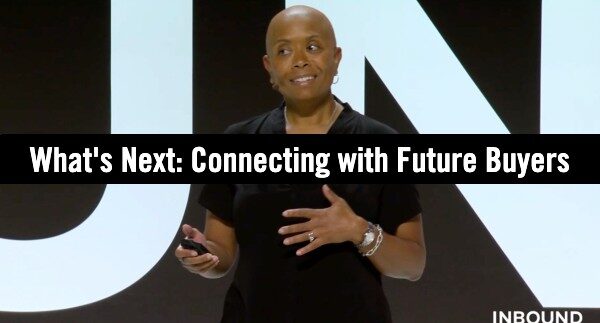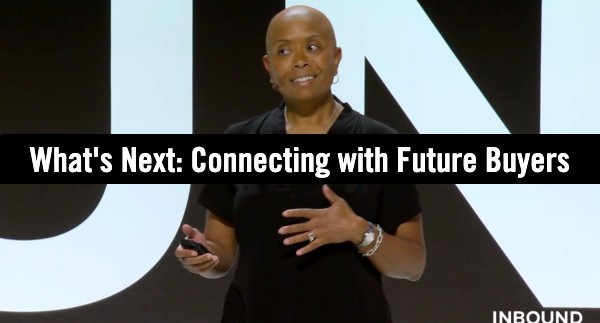
The 2022 edition of HubSpot’s INBOUND conference is an interesting mix of live and streamed sessions. As a B2B marketer that relies daily on LinkedIn, I was really looking forward to the insights Allyson Hugley, Global Director, Customer Insights at LinkedIn Marketing Solutions* had to share in her streamed What’s Next presentation, Connecting with Future Buyers: Winning Mindshare to Grow Market Share.
With over 850 million members, Linkedin is the top of the mountain when it comes to data around business professionals and Allyson did not disappoint in sharing her insights. According to research from Business Insider, people trust LinkedIn more than any other social platform. That trust and the rich insights available are essential for B2B marketers in understanding how to most effectively attract and engage future business buyers.
Emerging macroeconomic and geopolitical pressures and industry convergence are reshaping the marketplace. At the same time, a new generation of workers is entering and reshaping the workplace.
As life and work intersect, B2C and B2B mindsets and needs are changing. To stand out, brands must demonstrate how they fit into and impact customers’ new-normal.
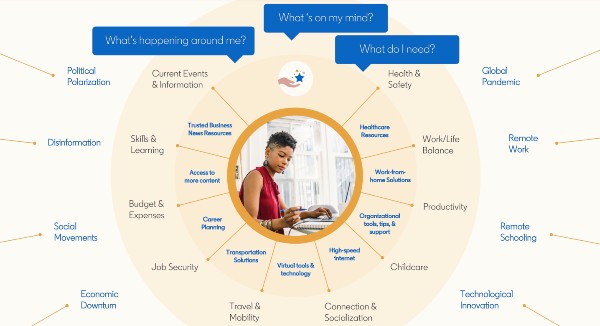
Image source: LinkedIn
New navigation tools – new concepts, frameworks, and metrics are needed to guide marketers toward the next opportunity – the future customers, buying groups and talent to achieve growth.
3 Keys to Connecting with Future Buyers
1. Break Through Barriers: Evolving Content Expectations
For Business Leaders, Managing the Future Is Paramount. Successfully guiding customers forward through an environment fraught with complex disruption is critical.
Confidence in C-Suite executives has dropped 11 points post covid (Deloitte) and at the same time, B2B decision makers say there’s been a huge increase in thought leadership content but 71% say less than half gives them valuable insights. (Edelman / LinkedIn)
What do buyers of the future want? 81% prefer thought leadership that offers provocative ideas that challenge their assumptions regarding a topic, over content that validates current thinking. (Edelman / LinkedIn). B2B buyers want content that stimulates their thinking to helo generate new ideas, not simply to maintain the status quo.
2. Create Mental Availability: New Outcome Models
Most B2B marketers have experienced that decisions are increasingly made by a committee of individuals averaging 6.8 people. Adding to this complexity the vast majority of B2B buyers are out market (95%) vs. in market to buy. This means reaching buyers who are not ready to buy yet is critical.
So how do B2B companies engage out market buyers to be top of mind when the time comes? According to LinkedIn B2B Institute research, B2B marketers need to focus on memories and situational awareness. Understanding category entry points is essential to staying top of mind during buying situations.
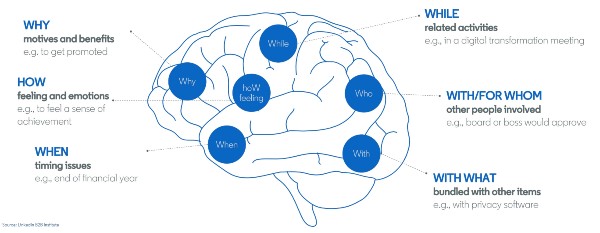
Image source: LinkedIn
3. Understand Future Buyers: Changing Buyer Demographics
Gen Z is today’s future buyer making up 27% of the workforce. To effectively engage this growing cohort, B2B brands need to start establishing relationships now.
One of the first things to understand is that Gen Z is leading the great reshuffle with job transitions up 80% year over year. Gen Z is also the most mobile generation with a migration rate at 23%. (LinkedIn).
According to research from PeopleGoal and McKinsey, Gen Z are career minded, crave stability, are analytical and well-researched, and have a high aptitude for social awareness.
Each generation has different learning agendas and content preferences. Allyson suggests B2B brands place their brand DNA at the heart of content and communication to build consistency and trust.
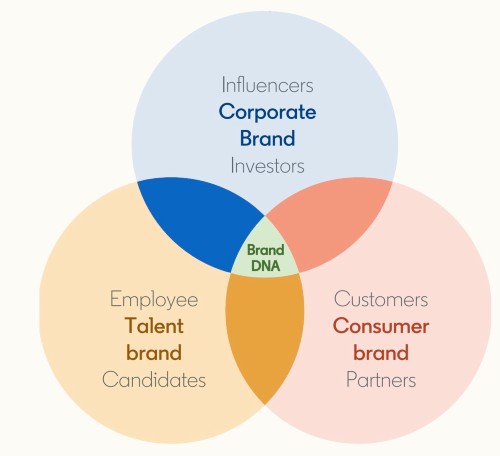
Image source: LinkedIn
Key takeaways from Allyson’s session:
Buyers’ bar for content is higher making it more challenging to breakthrough. You need to spend the time to truly understand what information will make an impact.
Understanding and utilizing Category Entry Points are required to create the situational awareness critical to capturing future buyers’ mindshare.
The next generation of buyers will be more mobile, technical and focused on business and societal purpose. Ignoring that different audiences have different preferences and learning agendas will be a critical mistake.
If you’re hungry for more LinkedIn perspective on B2B marketing, I’ll be doing my best to cover Ty Heath’s presentation on Friday, Category Entry Points In A B2B World – Buying Situations to Brand Sales.
*LinkedIn Marketing Solutions is a client of TopRank Marketing.
